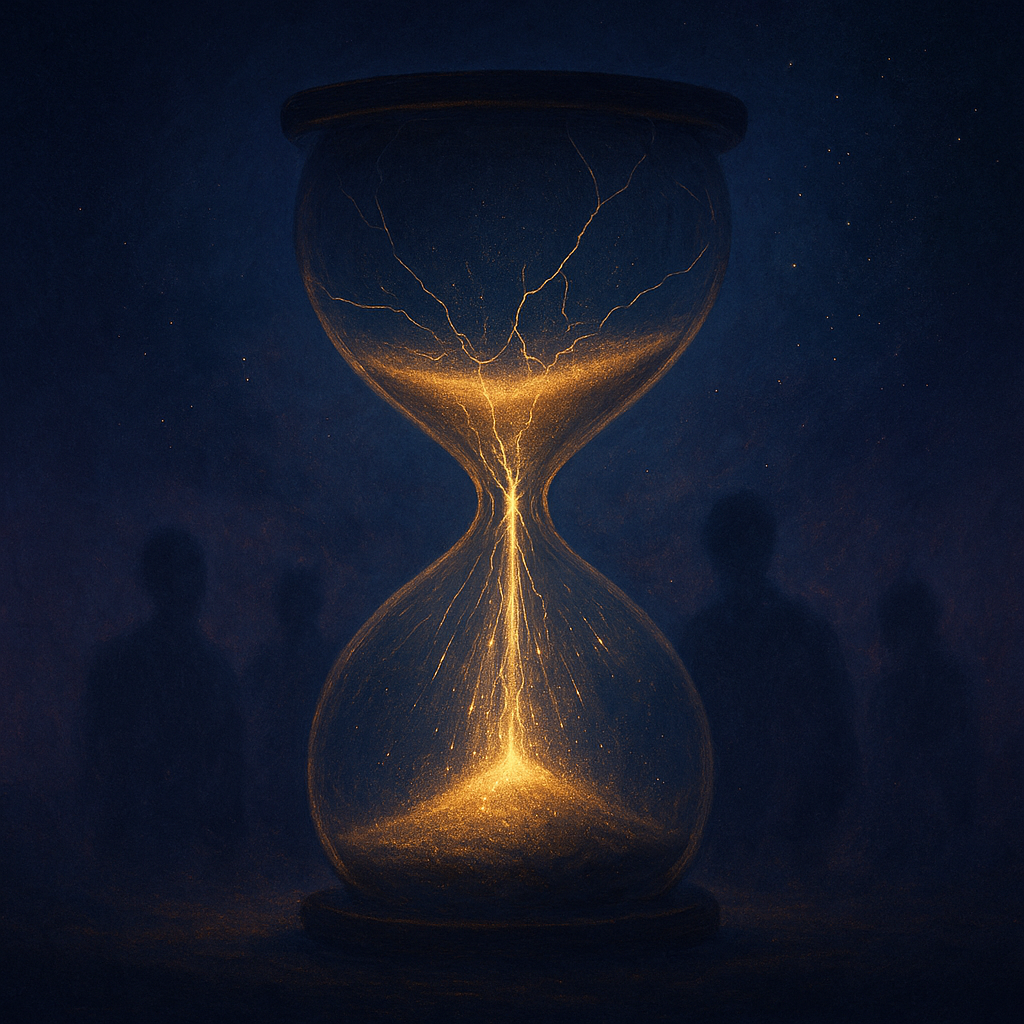We are all together with our favorite friends, the conversation is flowing, even if we don't express it to each other openly, it's literally a time when we are all having a lot of fun and at peace.
Then we look at the clock and aha! It's 11:00, if we don't get up now we're going to miss the last train.
It's all gone to hell.
Anyway, I'll come to the point, when we're happy, time passes quickly. But if we're bored, if we're in pain, or if we want to see someone we love again, time just doesn't pass.
But dear Einstein, what happened to time being relative?
If we're unhappy, it passes constantly slowly, and if we're happy, it passes constantly fast?
I know it's a bit speculative, but that's the way it is.
In this article I will try to reason about the concept of living in the moment. Together we will explore the relationship between mind and time, how we experience the phenomenon of time and how this can affect our quality of life.
Then let's get started!
Philosophical and Scientific Background
Philosophical Approach:
Martin Heidegger - Being and Time:
Heidegger defines time as an existential field of experience, not just as a measuring device or a number indicated by a clock.
What we are taught in school is that what is called "the present" is usually a period of time in the middle of past - present - future time. According to Heideger, however, the understanding of time as moving in one direction is not sufficient.
Dasein means:
Dasein (man existing) means: time and man are not two separate concepts, but the being we call man is a being existing with time itself.
What does this mean?
It means:
- "Now" is not a fixed moment; it is shaped in the future orientation (Entwurf) of Dasein. That is, the human being is a being that is always moving towards something; to the extent that it is open to the future, it constructs the present.
- The past is not a passive structure either; Dasein's place of origin, habits, fears, experiences feed on the past and determine its present.
- Therefore, what is called "now" is actually an existential tension stretched between the echo of the past and the call of the future.
Heidegger calls this exstatic time. For according to him, time is lived on three axes (past, present, future), but not in a fixed but overflowing (extasis).
This is why what we call "grasping the moment" is often not possible. Because the moment is something that is already happening and continues to happen, something that cannot be fixed. The more we try to fix it, the more it slips away.
Buddhist Perception of Time - Zen and Theravada Perspective
In Buddhist thought, time is not an unquestionable reality that exists in nature and is valid for everyone, but a perceptual pattern constructed by the mind.
What we experience as time is actually a web of relationships between memories (past), expectations (future) and present sensations (present).
This web of relationships is not absolute, but constantly changing depending on the mind.
Zen Perspective:
Zen Buddhism proceeds through direct experience rather than an intellectual explanation of time.
- The present moment is where there is no thought.
- If there is thought, you are preoccupied with the past or the future.
- Therefore, it is possible to "feel the moment" by temporarily letting go of the mind's own construct of time.
Zen master Dōgen famously said:
Time is being, and being is time. (Uji - Being-Time teaching)
So we don't experience time; we are time itself. Every existence is a "moment". The blooming of a flower, the taking of a breath, the blinking of an eye... according to him, these are not actions, they are time itself.
In this understanding:
- "The past" is a trace that exists only in the mind
- "The future" is an expectation
- "The present" can become real when experienced without entering into thought
When the flower blooms, it is not thinking like: Let me bloom, also.
🪷Theravada Perspective:
In the more classical Buddhist understanding, the nature of time is not fixed:
- The mind operates in springs: each moment of consciousness bears the trace of the previous one but produces a new moment
- Reality is an ever-changing flow (anicca - impermanence)
- Things like "I" or "now" are actually illusions fixed in this flow
Thus:
- Past: a construct remembered but reconstructed in the present
- Future: a hypothetical construct of the mind
- Now: a moment that carries both the effects of the past and the future, but can exist only with awareness
This is why a Theravada master's definition of meditation is so simple:
"To know what is in the mind and realize that it is changing."
This state of awareness loosens the mind's construction of time.
Henri Bergson - Duration (Durée)
The French philosopher Henri Bergson, known for his thoughts on time, consciousness and creativity, has some observations on this subject.
In short he says:
1 - Measurable time and lived time are not the same thing.
According to Bergson there are two types of time:
- Chronometric time (temps): External and measurable time, ticking on a clock. It is used to organize the physical world. In the Newtonian and Kantian conception, time is a homogeneous line flowing through the external world.
- Time (durée): It is a continuous and qualitative experience that flows through consciousness. It is related to how we "feel" and "remember" the events we experience.
For example:
The 10 minutes that pass when someone you are expecting is late feel much longer than the 10 minutes you spend with your lover. Even though the clock measures the same time, "inner time" is variable.
2 - Time cannot be divided into parts
According to Bergson, time cannot be divided. He sees the mathematical division of time as an illusion. Because duration in our consciousness is a unified and interwoven flow like the flow of a melody.
Each note exists with the echo of the previous one. Take one out and the whole melody breaks down.
Scientific Approach:
Nörobilimde Zaman Algısı: How the Brain's Internal Clocks Work
While time flows steadily in the external world, the brain processes it subjectively. This is why some moments flow like water, while others seem to freeze. The brain's "internal timers" (internal clocks) are behind this:
1. Regions of the Brain that Measure Time
- Prefrontal cortex: It is involved in attention, decision-making and timing. It plays an important role in recognizing time.
- Cerebellum (cerebellum): It is especially active in millisecond timing processes. It is involved in keeping the rhythm when playing music or timing words correctly when speaking.
- Basal ganglia and striatum: Involved in movement and estimation of time intervals; in diseases such as Parkinson's, time perception is also impaired.
- Insular cortex: Associated with internal body sensations and the "sense of passage" of time.
2. Factors Altering Time Perception
The perception of time is not fixed; it is constantly changing with the neurochemistry of the brain, attention level and emotional state:
- Trauma and Anxiety: In times of danger, the amygdala is stimulated and time feels as if it has "slowed down". This is because the brain tries to record the moment in detail (survival mode). I don't want anyone to experience this, but I know people who have felt time slow down during an accident or a disaster.
- Depression: Time stretches, the days drag on. A drop in dopamine levels slows down the perception of time.
- Meditation: When mental noise is reduced, the passage of time is felt as "flow". The brain's default mode network is deactivated.
- Intense emotions such as love, fear, happiness also speed up or slow down time because the way we pay attention and store it in memory changes.
In short: time is the brain's interpretation.
Physically, a second is always a second. But how the brain interprets this varies depending on both our psychological state and our biological systems.
Chronobiology:
- Siradian rhythms affect not only biological processes, but also time-related awareness. Jetlag, sleep deprivation or seasonal depression distort the perception of time.
- Conflict between mind and body clocks: The mismatch between our internal perception of time and social time may be one of the root causes of chronic restlessness.
Real Problems and Solutions
Problem:
Modern life:
Okay, we understand, we have learned that time works the way our brain perceives it, that the past and the future are all interconnected, but what do we do now?
We are drifting in modern life, they are shoving the beauties that others live in front of our eyes, we go back in time and we start to wonder why we couldn't be like this, our minds are narrowing, we are thinking about the vacation we will take in the summer, we are trying to foresee a few moves ahead in order not to make a mistake while doing a job, then how will we live this "now"?
In addition to these, notifications, to-do lists, productivity pressure and performance culture drag us either into the past or the future.
Mind and body are out of sync:
Our minds are always planning for the future, our bodies are stuck in biological echoes of the traumas of the past. The "moment" should arise from the harmony of these two, but often it doesn't even occur.
What can we do to overcome this problem when our perception of time is so complex?
Solution Suggestions:
In the light of all these theories, what is the real problem we are experiencing in our modern life?
Let me share with you the solutions I have come up with:
Sensing Time Instead of Counting It
We can try keeping time with the body rather than with the clock.
For example, for a day (or for 1 hour at work, let's choose a time zone that suits us), let's not look at our watches at all, but just pay attention to when our body gets tired, hungry, wants to rest.
Noticing the flow of time from the inside, not from the outside, is not a skill that special people have, but a remembrance that everyone can experience.
Hearing the Rhythm of Time
Instead of just listening to a piece of music, we can try synchronized breathing with it, or matching it with the melody in our minds.
This experience, which is in line with Bergson's understanding of "duration", will allow you to experience time not as a chart, but as a lived wholeness.
Just as we don't realize how music passes, so does time. If we don't notice it while we are living, it passes, it cannot be measured. But if we are aware of it, if we really manage to stay in the moment, and if we manage to enjoy that moment, wouldn't it be beautiful?
"Establishing the moment" is an action
What we call "now" is not a passive point that exists on its own; it is a state of consciousness that we create. Trying to fill this moment of consciousness with the past, the future, troubles, sorrows and even joys takes us away from the moment. I think this is one of the greatest evils one can do to oneself.
If we take three deep breaths before we start a task, if we touch an object we like in the space we are in, if there is a nice smell, if there is a nice melody, if we focus on it, wouldn't we be living more in the moment with all the senses in our body?
Time is not determined by external conditions, but by the direction of attention. Understanding this increases our awareness and practicing it creates it.
Micro-rituals that Slow the Speed of Time
We can try to do a daily routine (e.g. brewing tea, washing our face, putting on our shoes) with conscious slowness. In chronobiology, such constant repetition synchronizes the mental clock with the physical clock, giving peace of mind.
Whatever we are doing, when we do the same thing consciously, we are no longer doing it, we are living it.
This includes thinking.
There is a problem, we thought about it for 5 minutes, we couldn't find a solution, we can waste 1 hour thinking about the same thing in the next hour, or we can take a break, live in the moment with our 5 senses for a few minutes, take deep breaths, drink water, turn on some nice music, watch something funny, and in this way we have time to find different ways to look at it and solve that problem in 10 minutes.
If it's something that will never be solved, it's also up to us to accept it, make peace with it and try to make sure that this broken thing doesn't spoil the rest of the good things.
Anyway, I've gone on too long, but it was necessary. It is important to stay in the moment.
Not "Winning Time", but Making Peace with It
The pressure to "use time well" turns our relationship with time into a race for efficiency. But we want to live harmoniously, not efficiently. That's why time management should not be about time management, but about friendship with time.
Perhaps it's not about capturing time, but about learning to travel with it.
Conclusion and Message to the Reader
Time flows like a river that we often don't realize we are living in. We try to measure it, control it, even manage it. But perhaps time is not something to be controlled; it is something to be navigated together, hand in hand.
The reason why we are unable to experience time is not because it is passing too fast; it is because we are too far away.
Sometimes we think of a future possibility, sometimes we lament a past possibility. Yet life is only happening in the moment.
Perhaps "living in the moment" is not a feat, but a matter of courage:
Taking the risk to stop, slow down, look and stare.
Learning to wait, to be bored, to feel again.
I would like to leave you with a question as I close this article:
Is time an enemy, a tool or a companion for you? Have you really tried to make friends with time today?"
In my next article, we will discuss another thing that disappears with time: our attention.
Why can't we focus on anything anymore?"
Who rules our minds and where are we in this equation?"
Till then,
Till then,
Stay in love.





